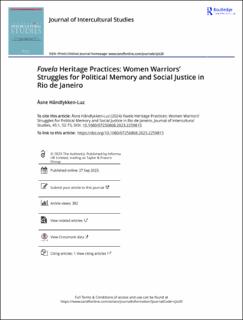| dc.contributor.author | Håndlykken-Luz, Åsne | |
| dc.date.accessioned | 2024-03-14T07:45:44Z | |
| dc.date.available | 2024-03-14T07:45:44Z | |
| dc.date.created | 2023-09-21T11:47:31Z | |
| dc.date.issued | 2023 | |
| dc.identifier.citation | Håndlykken-Luz, Å. (2024). Favela Heritage Practices: Women Warriors’ Struggles for Political Memory and Social Justice in Rio de Janeiro. Journal of Intercultural Studies, 45(1), 52-73. | en_US |
| dc.identifier.issn | 0725-6868 | |
| dc.identifier.uri | https://hdl.handle.net/11250/3122293 | |
| dc.description.abstract | This article discusses everyday spatial heritage practices in Rio de Janeiro’s favelas. It focusses on the experiences of faveladas, Black and poor women residents of the favelas, as they build their houses and struggle for political memory in the city. Based on ethnographic fieldwork and photowalks conducted in 2011–2013 and 2018 with residents of the favelas of Pavão-Pavãozinho and Cantagalo (PPG), this article documents the insurgent heritage practices of ‘women warriors’ and analyses the ways in which these practices typify means of resistance to urban coloniality. I draw on theories by the Afro-Brazilian feminist scholars and activists Beatriz Nascimento on quilombos (maroon communities) and Lélia Gonzalez on ‘Amefricanity’, who recourse to black and indigenous women’s Southern Atlantic experiences of oppression and forced migration and of resistance, to suggest the notion of ‘Amefrican’ heritage practices. The women warriors’ spatial practices and resistance encompass curated favela heritage. They challenge prejudice against the favelas and Afro-Brazilians, thereby sustaining ‘Amefrican’ heritage practices and shaping Rio de Janeiro’s cultural heritage and future, especially against contemporary processes of urban coloniality. | en_US |
| dc.language.iso | eng | en_US |
| dc.rights | Attribution-NonCommercial-NoDerivatives 4.0 Internasjonal | * |
| dc.rights.uri | http://creativecommons.org/licenses/by-nc-nd/4.0/deed.no | * |
| dc.title | Favela Heritage Practices: Women Warriors’ Struggles for Political Memory and Social Justice in Rio de Janeiro | en_US |
| dc.type | Peer reviewed | en_US |
| dc.type | Journal article | en_US |
| dc.description.version | publishedVersion | en_US |
| dc.rights.holder | © 2023 The Author(s). | en_US |
| dc.source.pagenumber | 52-73 | en_US |
| dc.source.volume | 45 | en_US |
| dc.source.journal | Journal of Intercultural Studies | en_US |
| dc.source.issue | 1 | en_US |
| dc.identifier.doi | https://doi.org/10.1080/07256868.2023.2259815 | |
| dc.identifier.cristin | 2177550 | |
| cristin.ispublished | true | |
| cristin.fulltext | original | |
| cristin.qualitycode | 1 | |

